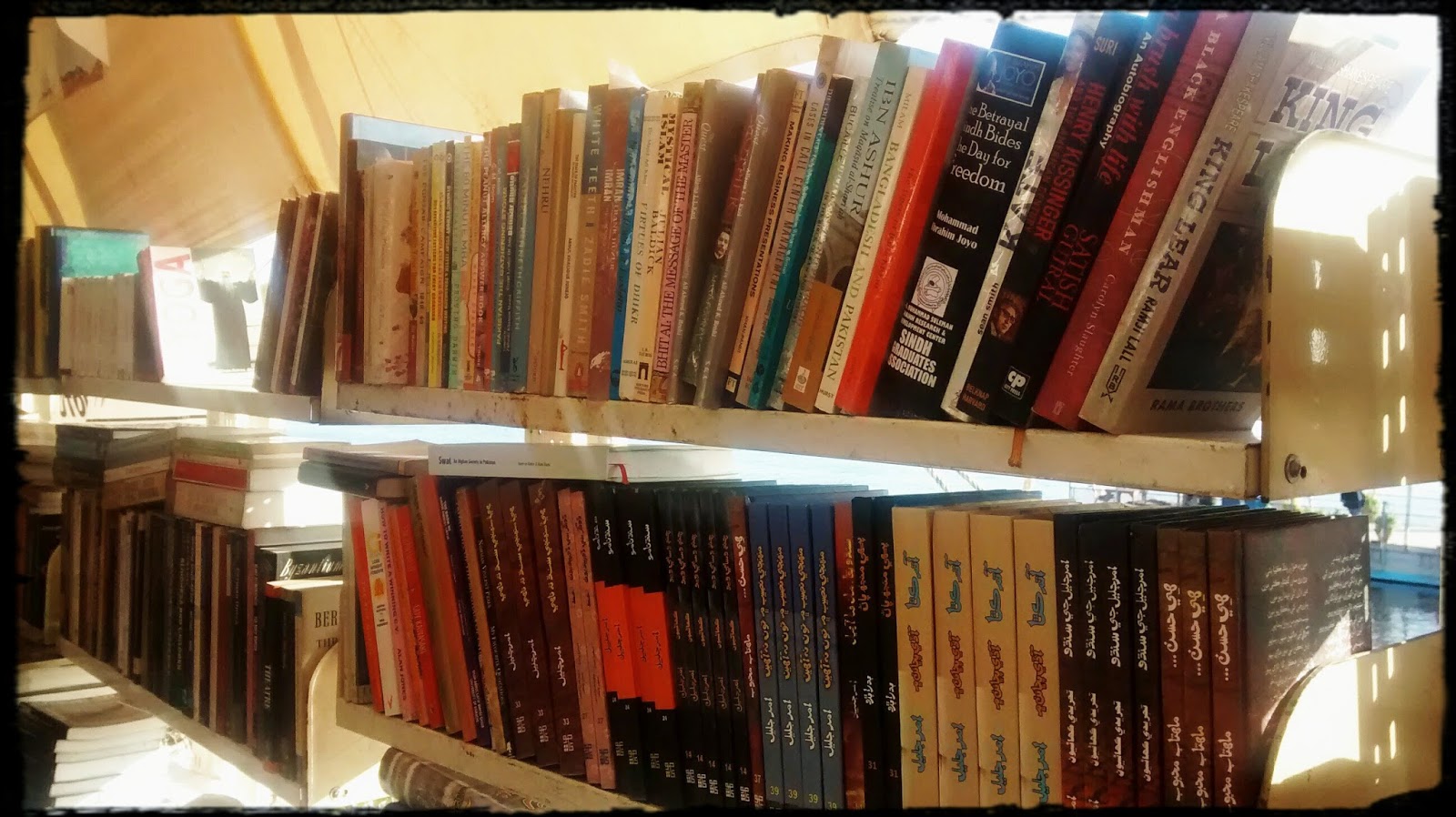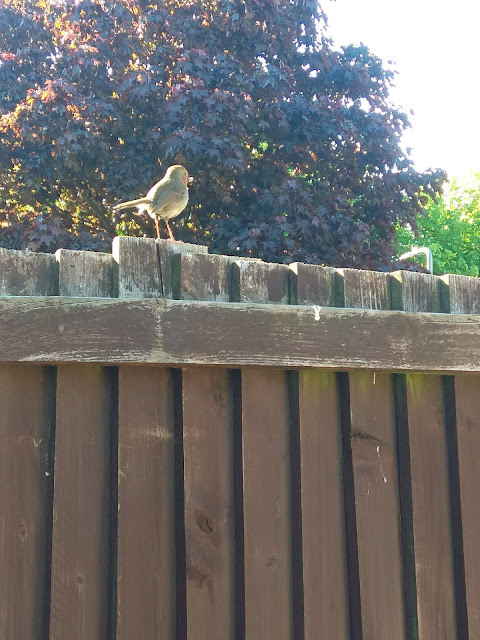Karachi Likes to Read
Karachi
Scribbles VII
Well, not
really. To quote Mohammad Hanif, “humein parhney likhnay ka shoq kum hai.
Humein BBQ ka shoq hai.”
However,
for most of the year we may prefer barbecued kabobs to books, but come the
first weekend of February and we forget that for a couple of days. Instead we
gather around to listen to writers, activists, politicians, showoffs,
playwrights and more; we walk around blue, green, yellow, orange books laid out
like bright candies across tabletops and stacked on shelves, the glistening
dirty water of the creek by Beach Luxury Hotel catching the sun in the backdrop.
I remember
the first Karachi Literature Festival, back in 2010, and how incredulous I was
at the idea of walking in for free and listening to some of my favorite
Pakistani authors and those I hadn’t ever read, of getting the chance to hear a
heartthrob former instructor talk in that articulate way that makes you believe
in things, going over a program to figure out if I wanted to hear views on
politics or art or how fiction and drama intersect. Actually walk past these
guys and discover which ones have an ego resting beneath their chin, propping
it higher than necessary, and which ones are just cute and wear mismatched socks.
Five years
later, the festival has become much bigger with over 70,000 people (the stats
from 2014) walking in through the metal scanners over the spread of three days
and although I don’t quite like having to push through people for my free water
bottle (seriously, sometimes I like corporations because they arrange for free
things at already free festivals) and have uncles trip over my feet in their
excitement to shake a famous person’s ordinary hand, I can take a step back and
appreciate it.
It was a
bright blue sky with a smattering of white clouds, the palm trees looked
taller, more like we were at a beach in Florida, and the breeze wafted sweetly,
moving the canopy over main garden and softening the heat of the sun, making
people sitting in the shade glad they had their shawls and light jackets.
I didn’t get
a chance to sit in on more than two sessions (to tell you the truth the
speakers and topics this year weren’t very exciting to me) but I enjoyed both. The
first was in the open area under the abovementioned canopy with the abovementioned
Mohammad Hanif. Seriously, there are few men who can pull off light pink pants
and a white shirt with a matching pink print of thankfully tiny polka dots, but
M.H is definitely one of them.
I like
listening to him because he’s funny, witty and disarmingly honest. There are no
airs about him at all. He admits to making things up on the spot (rather than
give a convoluted abstract reasoning that people can only slightly tell they
kind of don’t really understand but like the sound of). He told his audience
how he actually hates the process of writing. While other authors would extol
the painful but rewarding process of penning their lofty thoughts down, about
how they can see themselves do nothing but write and it just comes to them like
dryness to ankles in the winter, M.H. said he procrastinates for ages when it
comes to writing. I like the finished products though, he had added. (So do we.)
He talked about his son who overthinks the act of getting his dad a glass of
water, and he shared his thoughts about how hard it is to be a journalist, and
the responsibility of media, so forth.
The moderator
was a funny lady if a little self-involved (I mean why do you need to read so
many things written by a writer who is actually sitting there cross-legged in
his pink pants next to you?). She was theatrical though and I did enjoy M.H’s
discomfort when she brought up his description of female anatomy. “I think a
writer always regrets having written things like that,” he had mumbled and
tried to shift her attention elsewhere, mentioning the kids in the audience.
And the
audience! Whenever the discussion shifts to the question answer part, I wait
for a few minutes. There are certain kinds of people who stand up and ask for
the mic. Some have interesting questions but most say things like: “Writers don’t
make too much money … blah blah… you must have made quite a lot of money with
your bestsellers!” and since that wasn’t direct enough, the kind lady went on
to ask M.H. about how much he really made.
Then there
are the ones who just want to complain and say things that don’t really need a
reply, and to that M.H. would say: “I guess I’ll try harder next time.” Almost all
of these questioners love to hear themselves talk, sometimes losing track of
what they had wanted to ask in their useless comments aired aloud (things like:
I love coming here to the literature festival.)
The next
session had an Indian theater person as well as a British writer along with
three Pakistani literati. The moderator lady, however, really shouldn’t have. Been
a moderator, I mean. She kept forgetting she was in a large hall with a lot of people
sitting far from the stage and so instead of eliciting responses from the
panelists in clear, loud tones she would start mumbling away from the mic, an
incomprehensible accented muttering of words as annoying as the buzz of
mosquitoes that tickles our ears when we’re trying to fall asleep at night. The
speakers though were better and they brought the theater scene in Bangalore and
that in England in comparison with the experiences in Pakistan, highlighting a
lot that we lack here but some things that can take pride in too.
Another thing
worth mentioning about KLF is that unlike the other festivals (Creative Karachi
and Karachi Eats), you don’t see the same class of people milling about. The free
entry, a location with grass, water and some not-too-pricey food options, it
allows a lot of people to come in and listen to talks about tolerance, poetry
and politics or even just walk around. Students from colleges and public
schools browsed books and ate biryani from Styrofoam plates, there were jeans
and scarves and shalwar kameezes and just a lot of Karachi. Maybe a few
years from now, the food festival will be able to break down the barriers just
a little bit too.
The late
afternoon sun was beautiful, orange and mellow, making it hard to take selfies
without squinting (unless you were cool and wearing sunglasses like all cool
people do), and casting the entire place in a golden glow, with the wind and an
occasional rower out in the water, hot tea and bun kababs, books and writers,
and perhaps a friend or two, it really was a lovely time to be in Karachi.



Comments
Post a Comment